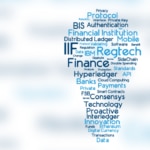10 keys to understand what regtech is all about
Regtech is the new concept that is revolutionizing financial technology. Regtech is paving the way for a new wave of startups that, leveraging technologies such as cloud computing or big data, are looking to save banks a lot of the time and resources they devote to ensure regulatory compliance.

BBVA hosts today the first RegTech Innovation Lab of the Institute of International Finance (IIF) at the BBVA Innovation Center. In this interview, Javier Sebastián, BBVA Research’s expert in digital regulation explains the keys to understanding the revolution that will come with technological progress at the service of financial regulation.
- What is regtech?
Regtech is a term coined to classify a group of companies that, by harnessing the capabilities enabled by new technologies such as cloud computing, big data, and blockchain, are devising solutions to help companies across all sectors of activity ensure that they comply with regulatory requirements. In the financial sector, regtech is deemed a subarea of what is generically known as fintech.
- It is said that regtech could become a truly disruptive element for the financial industry. How can it change the financial sector? What advantages does it offer?
We need to take into account that regulatory compliance is one of the most time- and resource-consuming activities for financial institutions. The situation has gotten even worse after the financial crisis, which prompted authorities to significantly increase information requirements. From this standpoint, regtech solutions offer two significant advantages for banks: first, significant savings in terms of cost and effort, and second, the possibility to report far more accurate information to supervisory bodies.
Regtech solutions also allow banks to boost their responsiveness to regulatory changes, because they are, in theory, designed to adapt dynamically to new requirements in an almost immediate manner.
From the standpoint of regulatory authorities, Regtech solutions also offer clear benefits. The increased level of information accuracy, granularity, and availability – almost in real time, ideally - they enable, should make it easier for them to monitor systemic risk.
- Do you think that all banks will end up using regtech?
Actually, banks are already using technological tools to meet regulatory requirements. What makes regtech different is that its proposal builds on the new technologies. These technologies allow to improve information responsiveness, flexibility, availability and accuracy levels. Most likely, all banks will end up using regtech solutions, not only because of how fast the ecosystem is growing, but also because the big incumbents in this field are also adopting technologies that rely on regtech solutions.
- How does a regtech solution work? From what sources does it draw to stay up to date with current regulatory developments and how does it apply them to the daily running of the business?
There is not a single type of regtech solution. They all work differently, depending on the regulatory areas they address. A solution that focuses on regulatory reporting will be different from one designed to ensure KYC (Know-your-customer) or AML (Anti-money laundering) regulatory compliance. It is a heterogeneous space, where not in all cases companies automatically update the applicable regulation.
In fact, we can consider that there is a subcategory of companies within the regtech segment that is working on what we call “regulatory awareness” solutions. These, precisely, use semantic analysis tools to automatically update regulatory requirements.
In any cases, among these companies we find different solutions that have the potential to improve the interaction with the supervisor, both in the communication from the regulator to the company and in the reporting that would go from the company to the regulator.
- When people talk about regtech solutions, they mention a broad range of technologies such as big data and data visualization. What technologies are essential in a regtech solution?
Indeed, the term regtech encompasses a great variety of technologies. If there’s a defining trait that all regtech solutions share, is that they all need to be cloud-based. This is considered the only way to ensure that they are responsive and flexible enough. Taking that as a starting point, any technology aimed at enhancing how information is managed and analyzed – which is what it is all about in the end – could become part of a so-called regtech solution.
This includes, of course, big data and data visualization techniques, and also the blockchain technologies used as immutable ledgers of shared information, as well as artificial intelligence elements, which include anything from the understanding of natural language and semantic analysis to deep learning.
- At what stage is regtech today? Does it still have a long way to go before it is ripe?
The ecosystem is currently exploding. Dozens of regtech startups have popped up in the past five years (although the term itself only appeared about one year ago). From a market perspective, it is still too soon to know how things are going to evolve, if companies are going to start merging or taking over each other, or if we will start seeing bigger players buy some of these smaller ones.
Technologically speaking, the level of maturity is variable: For instance, there are biometrics-based identity management solutions that are quite mature, and we’ve already seen some quite solid and reliable tools within big data. Of course, solutions based on more immature technologies, such as blockchain or artificial intelligence, still have a long way to go.
- What RegTech companies are managing to stand out in the market? Have any suppliers managed taken the lead as providers of this kind of solutions?
Just as it happens with any nascent ecosystem, there are indeed some companies which are mentioned more often than others by the media. However, at this point, it is still really hard to tell if any of them will actually establish themselves as market leaders. Some have made the news because of the volume of funds they have secured in early-stage funding rounds, such as Onfido, which focuses on the area of identity management.
There are other companies that are managing to stand out thanks to their innovative value proposals, such as Ayasdi (risk modeling), Sybenetix (behavior analysis in trading environments) or Suade (holistic regulation-as-a-service platform).
- Can regtech solutions be developed without involving regulators? Are they being involved?
In principle, one could think that authorities will not care about what solutions institutions resort to in order to comply with regulatory requirements, as long as they comply with them. This is not 100% true: There are certain areas where regulators should be as interested in the processes and tools as they are in results themselves. But also, in the case of regtech, as we already mentioned above, there are specific benefits for regulators, and that is why they are enormously interested on keeping a close eye on how this segment evolves.
In fact, the term regtech was coined by the FCA (Financial Conduct Authority), a regulatory body from the UK, whose interest in these solutions is what caused the rest of the world to start paying more attention to these companies.
- Could regtech be the response to the financial institutions’ demands for speedier decision-making processes from European Regulators when ruling over the innovations they aim to deploy to compete against digital players?
Regtech solutions are aimed at making it easier for financial institutions to comply with the regulations that exist at each point in time, and therefore should not have a direct impact on how fast regulators act when the industry wants to implement an innovation.
Lack of responsiveness from European regulators is the result of a combination of two factors: One intrinsic, due to the complexity of the processes required to establish a regulatory framework in any topic. The other one has to do with the fear of green-lighting the deployment of innovations that may compromise consumer protection or the financial system’s stability.
Regtech may be of help with this second factor: First, it is a quite innovative issue in itself that also yields direct benefits for regulators. This should make it easier for them to promote and adopt them.
And it could help change the regulators’ mindset by granting them greater control over systemic risk, which could help curb the fears that the introduction of innovations could trigger some sort of financial instability.
- Which will be the first regtech-enabled benefits that bank customers will start seeing?
Direct benefits are going to be mainly linked to improvements in customer identity management, fraud control - essentially in connection with payment methods – which will ultimately lead to safe end-customer operations. This benefit will also ripple across other areas of the organization, allowing to improve control over internal processes and reduce potential errors that may result in a regulatory breach, compromising customer protection. But there will also be a more global benefit, which is the enhanced oversight capability that regtech will enable for regulators.
This will contribute to developing a more transparent and controlled global financial system, making it harder, if not impossible, for a financial crisis to occur as a result of deficiencies in this area.
Javier Sebastián, Digital Regulation Manager at BBVA Research

Identifying and analyzing digital trends and their impact in the financial services industry, in terms of new business models and regulatory requirements. Global vision of the digital ecosystem, and special focus and expertise in blockchain/distributed ledgers and RegTech.
LinkedIn: https://www.linkedin.com/in/javier-sebasti%C3%A1n-cerme%C3%B1o-ba025b19
BBVA Research: https://www.bbvaresearch.com/